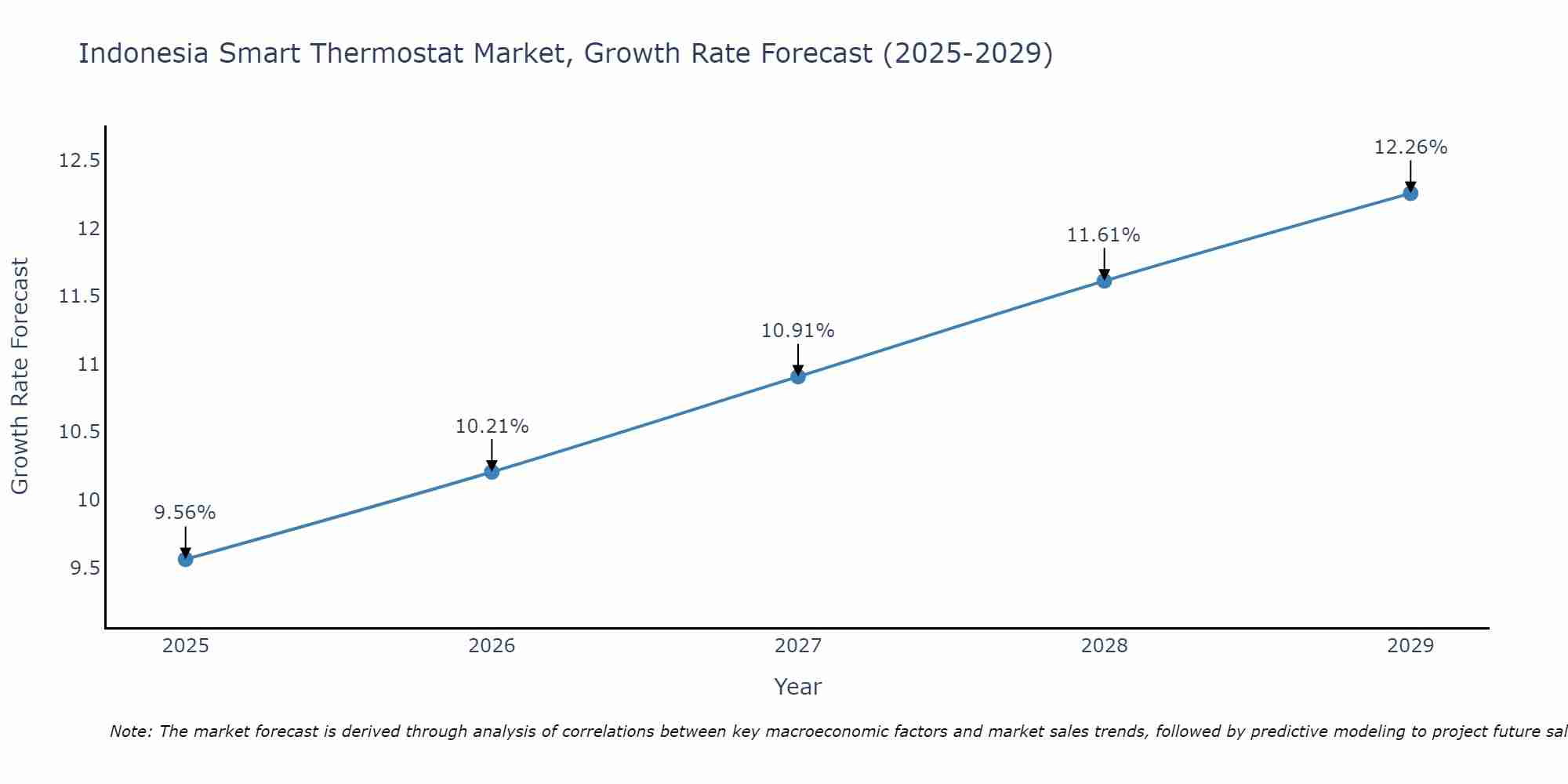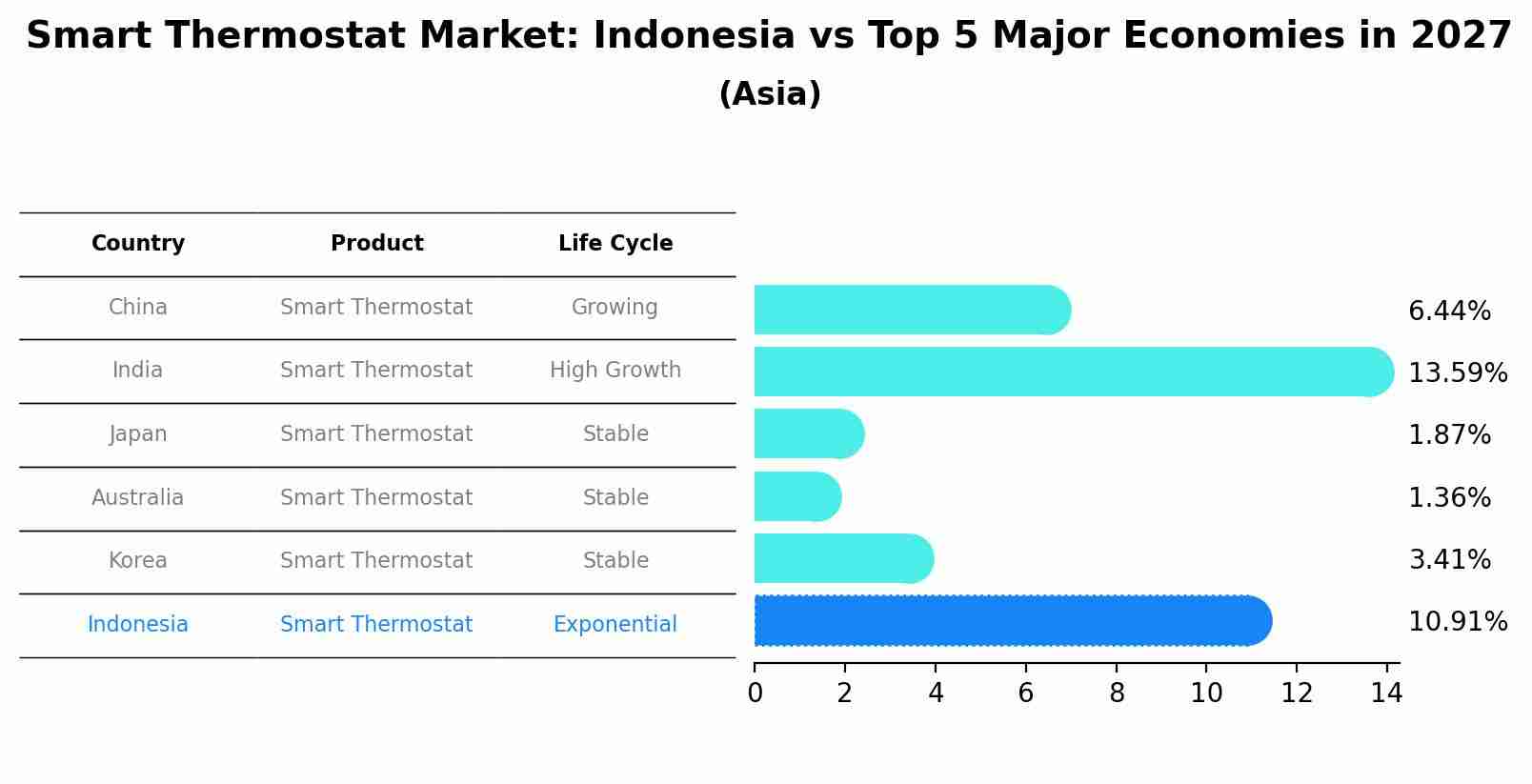Indonesia Smart Thermostat Market (2025-2031) Outlook | Forecast, Revenue, Companies, Trends, Size, Analysis, Industry, Share, Growth & Value
| Product Code: ETC369508 | Publication Date: Aug 2022 | Updated Date: Apr 2025 | Product Type: Market Research Report | |
| Publisher: 6Wresearch | Author: Ravi Bhandari | No. of Pages: 75 | No. of Figures: 35 | No. of Tables: 20 |
Indonesia Smart Thermostat Market Size Growth Rate
The Indonesia Smart Thermostat Market is likely to experience consistent growth rate gains over the period 2025 to 2029. Commencing at 9.56% in 2025, growth builds up to 12.26% by 2029.

Smart Thermostat Market: Indonesia vs Top 5 Major Economies in 2027 (Asia)
In the Asia region, the Smart Thermostat market in Indonesia is projected to expand at a high growth rate of 10.91% by 2027. The largest economy is China, followed by India, Japan, Australia and South Korea.

Indonesia Smart Thermostat Market Synopsis
The Indonesia smart thermostat market is experiencing growth driven by the increasing focus on energy conservation and smart home automation. Smart thermostats enable homeowners to remotely control their heating and cooling systems, optimizing energy usage. As energy costs continue to rise, the demand for energy-efficient solutions is on the rise. Smart thermostats also integrate with smart home ecosystems, enhancing convenience and comfort. The market is expected to witness increased adoption, especially in urban areas, as consumers seek ways to reduce their carbon footprint and energy bills.
Drivers of the Market
The Smart Thermostat market in Indonesia is experiencing growth driven by several factors. Firstly, the increasing focus on energy conservation and reducing electricity consumption in households is boosting the adoption of smart thermostats for efficient temperature control. Additionally, the integration of smart thermostats with home automation systems is driving consumer interest in smart homes. Furthermore, the government`s efforts to promote energy-efficient appliances and sustainable living practices are expected to support the market`s expansion.
Challenges of the Market
The Indonesia Smart Thermostat market faces challenges related to consumer awareness and affordability. Many consumers may not fully grasp the potential energy and cost savings offered by smart thermostats. The upfront cost of purchasing and installing these devices can be a deterrent, particularly in a market where budget constraints are prevalent. Furthermore, the compatibility of smart thermostats with existing HVAC systems and the need for skilled technicians for installation can be logistical challenges.
COVID-19 Impact on the Market
With more people spending time at home, the adoption of smart thermostats grew, enabling remote temperature control and energy savings. The market`s growth was also influenced by an increased focus on energy-efficient solutions during the pandemic.
Key Players in the Market
The Indonesia Smart Thermostat market is gaining traction as consumers seek energy-efficient and convenient heating and cooling solutions. Key players such as Nest Labs (a subsidiary of Alphabet Inc.), Honeywell International Inc., and Ecobee Inc. are leading the market with their innovative smart thermostat products. These thermostats can be controlled remotely via smartphone apps, optimizing energy consumption and comfort.
Key Highlights of the Report:
- Indonesia Smart Thermostat Market Outlook
- Market Size of Indonesia Smart Thermostat Market, 2024
- Forecast of Indonesia Smart Thermostat Market, 2031
- Historical Data and Forecast of Indonesia Smart Thermostat Revenues & Volume for the Period 2021-2031
- Indonesia Smart Thermostat Market Trend Evolution
- Indonesia Smart Thermostat Market Drivers and Challenges
- Indonesia Smart Thermostat Price Trends
- Indonesia Smart Thermostat Porter's Five Forces
- Indonesia Smart Thermostat Industry Life Cycle
- Historical Data and Forecast of Indonesia Smart Thermostat Market Revenues & Volume By Type for the Period 2021-2031
- Historical Data and Forecast of Indonesia Smart Thermostat Market Revenues & Volume By Wireless for the Period 2021-2031
- Historical Data and Forecast of Indonesia Smart Thermostat Market Revenues & Volume By Wireless for the Period 2021-2031
- Historical Data and Forecast of Indonesia Smart Thermostat Market Revenues & Volume By End-User Vertical for the Period 2021-2031
- Historical Data and Forecast of Indonesia Smart Thermostat Market Revenues & Volume By Residential for the Period 2021-2031
- Historical Data and Forecast of Indonesia Smart Thermostat Market Revenues & Volume By Commercial for the Period 2021-2031
- Indonesia Smart Thermostat Import Export Trade Statistics
- Market Opportunity Assessment By Type
- Market Opportunity Assessment By End-User Vertical
- Indonesia Smart Thermostat Top Companies Market Share
- Indonesia Smart Thermostat Competitive Benchmarking By Technical and Operational Parameters
- Indonesia Smart Thermostat Company Profiles
- Indonesia Smart Thermostat Key Strategic Recommendations
Frequently Asked Questions About the Market Study (FAQs):
- Single User License$ 1,995
- Department License$ 2,400
- Site License$ 3,120
- Global License$ 3,795
Search
Thought Leadership and Analyst Meet
Our Clients
Related Reports
- Canada Oil and Gas Market (2026-2032) | Share, Segmentation, Value, Industry, Trends, Forecast, Analysis, Size & Revenue, Growth, Competitive Landscape, Outlook, Companies
- Germany Breakfast Food Market (2026-2032) | Industry, Share, Growth, Size, Companies, Value, Analysis, Revenue, Trends, Forecast & Outlook
- Australia Briquette Market (2025-2031) | Growth, Size, Revenue, Forecast, Analysis, Trends, Value, Share, Industry & Companies
- Vietnam System Integrator Market (2025-2031) | Size, Companies, Analysis, Industry, Value, Forecast, Growth, Trends, Revenue & Share
- ASEAN and Thailand Brain Health Supplements Market (2025-2031) | Strategy, Consumer Insights, Analysis, Investment Trends, Opportunities, Growth, Size, Share, Industry, Revenue, Segments, Value, Segmentation, Supply, Forecast, Restraints, Outlook, Competition, Drivers, Trends, Demand, Pricing Analysis, Competitive, Strategic Insights, Companies, Challenges
- ASEAN Bearings Market (2025-2031) | Strategy, Consumer Insights, Analysis, Investment Trends, Opportunities, Growth, Size, Share, Industry, Revenue, Segments, Value, Segmentation, Supply, Forecast, Restraints, Outlook, Competition, Drivers, Trends, Demand, Pricing Analysis, Competitive, Strategic Insights, Companies, Challenges
- Europe Flooring Market (2025-2031) | Outlook, Share, Industry, Trends, Forecast, Companies, Revenue, Size, Analysis, Growth & Value
- Saudi Arabia Manlift Market (2025-2031) | Outlook, Size, Growth, Trends, Companies, Industry, Revenue, Value, Share, Forecast & Analysis
- Uganda Excavator, Crane, and Wheel Loaders Market (2025-2031) | Strategy, Consumer Insights, Analysis, Investment Trends, Opportunities, Growth, Size, Share, Industry, Revenue, Segments, Value, Segmentation, Supply, Forecast, Restraints, Outlook, Competition, Drivers, Trends, Demand, Pricing Analysis, Competitive, Strategic Insights, Companies, Challenges
- Rwanda Excavator, Crane, and Wheel Loaders Market (2025-2031) | Strategy, Consumer Insights, Analysis, Investment Trends, Opportunities, Growth, Size, Share, Industry, Revenue, Segments, Value, Segmentation, Supply, Forecast, Restraints, Outlook, Competition, Drivers, Trends, Demand, Pricing Analysis, Competitive, Strategic Insights, Companies, Challenges
Industry Events and Analyst Meet
Whitepaper
- Middle East & Africa Commercial Security Market Click here to view more.
- Middle East & Africa Fire Safety Systems & Equipment Market Click here to view more.
- GCC Drone Market Click here to view more.
- Middle East Lighting Fixture Market Click here to view more.
- GCC Physical & Perimeter Security Market Click here to view more.
6WResearch In News
- Doha a strategic location for EV manufacturing hub: IPA Qatar
- Demand for luxury TVs surging in the GCC, says Samsung
- Empowering Growth: The Thriving Journey of Bangladesh’s Cable Industry
- Demand for luxury TVs surging in the GCC, says Samsung
- Video call with a traditional healer? Once unthinkable, it’s now common in South Africa
- Intelligent Buildings To Smooth GCC’s Path To Net Zero


















